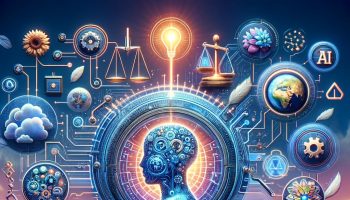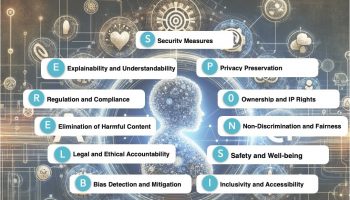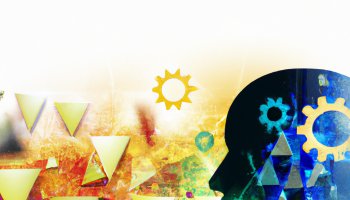Generative AI is transforming software development by automating tasks, enhancing collaboration, and accelerating innovation. This cutting-edge technology is poised to augment various software roles, creating diverse perspectives and opportunities for co-innovation. In this article, I will delve into the future of Generative AI in software development, discuss the ethical considerations, and summarize the potential impact on the industry.
Developers: AI-Powered Code Generation & Collaboration
Generative AI will enable developers to focus on more complex, creative tasks by automating mundane coding activities. AI-powered code generation will help developers solve intricate problems more efficiently and accurately. In addition, Generative AI will enhance collaboration among team members by suggesting code snippets or assisting with debugging, making it easier for developers to work together on large-scale projects. While AI-generated code promises increased productivity, developers must remain vigilant in reviewing and verifying its quality, ensuring the adherence to best practices, and addressing potential biases or security vulnerabilities.
QA Engineers: Intelligent Test Case Generation & Failure Prediction
Quality Assurance Engineers will witness a significant shift in their role with the advent of Generative AI. AI-generated test cases, edge scenario identification, and failure prediction will allow QA engineers to focus on improving software quality, reliability, and security. The integration of Generative AI into QA processes will make testing more comprehensive and efficient, reducing human error and enhancing the overall user experience. QA engineers must ensure fairness in the AI-generated test results, mitigate biases, and maintain the integrity of the software.
UI/UX Designers: AI-Enhanced Creativity & Inclusivity
Generative AI will play a crucial role in augmenting UI/UX designers’ creativity by providing design suggestions, generating UI components, and recommending user flow. This technology will enable designers to create more intuitive, visually appealing interfaces that cater to the needs and preferences of diverse user groups. AI-generated design elements can help designers experiment with various styles and layouts, fostering a more inclusive and accessible user experience. It’s essential for designers to maintain a human-centric approach, address potential biases, and prioritize user well-being.
Technical Writers: Streamlined Documentation & Code Examples
Generative AI will simplify the lives of technical writers by assisting in drafting documentation, creating code examples, and keeping information up-to-date. With AI-generated content, technical writers can produce clear, concise, and comprehensive materials more efficiently, ensuring that both team members and users have access to accurate, relevant information. Technical writers must remain accountable for the content’s quality, respect user privacy, and protect sensitive information.
Project Managers: Data-Driven Decision-Making & Planning
AI-generated insights for resource allocation, risk assessment, and project planning will enable project managers to make better data-driven decisions, keeping projects on track and under budget. Generative AI can help project managers monitor progress and adjust plans in real-time, considering various factors like team dynamics, changing priorities, and unforeseen challenges. However, project managers should remain responsible for the final decisions, ensuring AI-generated insights align with ethical principles and account for human factors.
DevOps Engineers: Streamlined CI/CD Pipelines & Performance Monitoring
Generative AI will streamline CI/CD pipelines, monitor system performance, and automate deployments for DevOps engineers. AI-generated optimizations will help DevOps engineers identify bottlenecks, proactively address potential issues, and maintain system stability. DevOps engineers must implement robust security measures in AI-augmented pipelines and ensure that AI-generated solutions adhere to best practices and organizational standards.
Architects: Optimal System Design & Scalability
Generative AI will provide architects with insights for optimal system design, technology selection, and scalability. AI-generated architectural recommendations will help architects make informed decisions, ensuring that systems are robust, flexible, and scalable to meet future demands. Architects should consider the long-term implications of AI-generated suggestions and choose AI solutions that uphold ethical standards and align with organizational values.
Opportunities for Co-Innovation
Generative AI promises to unlock numerous co-innovation opportunities across the software development landscape. By augmenting human intelligence and creativity, Generative AI can facilitate the exploration of new ideas, techniques, and approaches that were previously unattainable or time-consuming. Collaboration between AI systems and human experts can lead to the development of groundbreaking solutions, enabling organizations to stay ahead of the competition and drive industry transformation.
Ethical Considerations
As Generative AI continues to permeate software development, ethical considerations become increasingly important. Ensuring transparency, explainability, fairness, and accountability is vital in fostering trust, creating equitable solutions, and promoting responsible AI adoption. Software professionals must be aware of potential biases, privacy concerns, and other ethical issues that may arise when integrating AI into their work and proactively address them.
Summary
The future of software development will see Generative AI augmenting various roles, streamlining processes, enhancing collaboration, and unlocking new avenues for co-innovation. As AI technology continues to advance, software professionals must adapt to these changes and embrace the opportunities they offer. By integrating Generative AI responsibly and upholding ethical principles, the software industry can harness the full potential of this transformative technology to elevate the entire development ecosystem and create a more sustainable, efficient, and innovative future.




